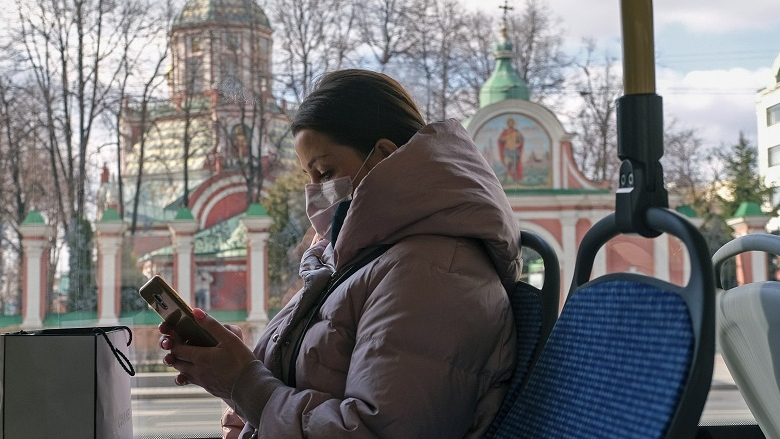In the past two weeks, I’ve observed from afar as various places around the world to which I have a personal attachment registered a grim uptick in coronavirus cases, and then, in response, effectively shut down. In Southern California, my mother was the first person I knew to self-quarantine; next were friends in Paris, who, in the span of forty-eight hours, went from eating lunch in cafés and planning a trip to Germany to hunkering down with their young children; then it was the turn of friends and colleagues in New York, where I lived for nearly a decade. During this time, Moscow, the city where I have lived for eight years, has felt like an unlikely outlier. Life here has definitely become stranger, but it is far from completely upended. As of Tuesday, Russia has four hundred and ninety-five official cases of covid-19, a small fraction of the number of cases in major European countries or in the United States.
Vladimir Putin has offered general assurances that the situation in Russia is “under control,” and, although Moscow’s mayor, a Putin loyalist, has closed schools and cancelled public events, the daily ebb and flow of the city hasn’t changed all that dramatically. I’ve mostly stayed at home, but the metro is still running, and shops and restaurants are open. The luxury department store Tsum is having one of its best years for sales in recent memory. Half my friends are observing some form of self-quarantine; the other half doesn’t get what the fuss is about—or, rather, their employers don’t.
It is unclear whether the Russian state has been lucky, smart with preëmptive measures, or dangerously incompetent—or some combination of all three. In the case of incompetence, Russia’s seemingly small figures will soon be replaced by colossal ones. In recent days, I’ve spoken to doctors, epidemiologists, and patients, to try and get a handle on whether Russia will be the next Italy, with an overwhelmed public-health system, or Japan, with its relatively flat and steady growth curve.
It is possible that, without having planned for it, Russian society, which is not nearly as defined by shoulder-to-shoulder public mixing as many European ones, had some advantages in weathering the early phase of the pandemic. Russia shares a twenty-six-hundred-mile border with China, but its most populous cities have fewer and less extensive ties with China than do many places in Europe. (Russian–Chinese trade topped a hundred billion dollars last year, but much of that came in oil and gas deliveries, a very different type of contact than one finds in, say, the many factories of northern Italy with a large Chinese labor force.) Russia is vast, with a relatively less developed transit infrastructure than European countries of similar populations. As a result, Michael Favorov, a doctor and public-health expert who previously oversaw C.D.C. programs in Eastern Europe and Central Asia, told me, “I wouldn’t expect a single outbreak in Russia but, rather, several, each with its own geography and developmental stages.”
It is also not impossible that Russia handled the early days of the pandemic with an admirable degree of foresight and care. In January, Russia shut down its land border with China. Beginning in February, passengers arriving to Moscow by plane from virus hot spots, such as China, Iran, and South Korea, were met by a phalanx of medical workers in protective gear administering tests. People who came from Europe—before those flights were cancelled—had their temperatures taken and were sent home for a mandatory fourteen-day quarantine. I talked to three people who developed symptoms while they were waiting at home for their test results, and who were put into isolation wards in a hospital in a Moscow suburb—a measure in line with recommendations from the World Health Organization to test and isolate. (I heard mixed reviews of this hospital, in the suburb of Kommunarka, which has become the city’s main coronavirus hub. One patient told me that he was “very impressed”; another complained that the swab she gave at the airport was lost and that she had to wait days to give another.) In theory, heavily policed authoritarian systems like Russia’s have a head start in tracking citizens—one man in Moscow, who had returned from Italy on the same plane as someone who later tested positive, was fined after cameras equipped with face-recognition technology caught him violating his mandatory quarantine by taking out the garbage. As I heard a political scientist acknowledge last week on Echo of Moscow, an independent, liberal radio station, “The fact that a certain regime is headed for a dead end in the long run doesn’t mean it may not have some advantages on the tactical level.” Melita Vujnovic, the W.H.O. representative in Moscow, recently told CNN, “Testing and identification of cases, tracing contacts, isolation—these are all measures that W.H.O. proposes and recommends, and they were in place all the time.
As the epidemic continues to spread, Russia may have a harder time tracking people who have caught the coronavirus at work, on the metro, or from relatives. Sergey Netesov, the head of the bionanotechnology, microbiology, and virology laboratory at Novosibirsk State University, who was previously a researcher at Vector—the state laboratory that developed the first coronavirus test in Russia—told me, “These are the most dangerous carriers, and I’m worried this contingent is not being caught at all, at least not yet.” For every story I heard that suggested a thorough, even overly paranoid, approach—one friend told me of his neighbor who was tested after other residents in their building heard her repeatedly coughing in the stairwell and called the city’s coronavirus hotline—I heard another story that conveyed a less encouraging image, such as that of a nineteen-year-old college student in Moscow who was refused a test, despite experiencing a fever and a persistent cough, even after her university dorm was closed for fear of coronavirus infection. I spoke to a man in Volgograd, a city in southern Russia, who told me that he had come down with pneumonia late last month. At the hospital, doctors told him that rates of pneumonia in the city were ten times higher than in previous years—every second or third patient seemed to be suffering from the ailment, they said. “I couldn’t stop coughing,” the man told me. “I was running out of breath every hundred metres—it reminded me of what I’d heard everyone talking about.” Doctors asked him whether he’d been in contact with anyone who had recently been in China or Europe—as far as he knew, he hadn’t—but they didn’t test him for the coronavirus. Stories like this, Vasilyeva said, may suggest either a purposeful coverup or simply a lack of know-how, equipment, and testing abilities, especially outside Moscow.
Russia has a higher number of ventilators per capita than many Western countries, which suggests that the country may not be in the worst position as the outbreak spreads. At the same time, according to numerous reports in the Russian press, doctors around the country are worried about a lack of training in how to deal with suspected coronavirus patients, and about a deficit of basic supplies, including masks and gloves. Higher up the chain, Russia’s bureaucracy tends to favor obedience and loyalty over competence. The first covid-19 patient in the Stavropol region turned out to be its chief infectious-diseases doctor, who’d ignored quarantine requirements after her return from Spain earlier this month. She visited several hospitals and taught numerous classes at the local medical university before coming down with symptoms and testing positive for the virus. As for the public at large, I’ve observed a kind of weary exhaustion among many Russians toward the state. The country has so many strict and redundant laws, in which the insignificant is made equal with the significant, that outsmarting or ignoring them is an understandable response. That may make it hard for the state to act with credibility and impact as it introduces measures meant to protect the population.
Lurking in the background, as infection numbers rise, is the question of the constitutional referendum scheduled for April 22nd. As I wrote earlier this month, this anodyne-sounding vote is really meant to allow Putin to run for a fifth, and possibly a sixth, term. The Kremlin wanted little fuss around the referendum, but the coronavirus is now complicating things. If infections climb exponentially, public voting will look more and more like madness, which is why the Kremlin has begun suggesting that the vote could be held in June. The Kremlin has also hinted that it may expand at-home voting, which sounds sensible, except for the fact that such a vote would be even more susceptible to fraud and manipulation than a normal Russian election. As with the facial-recognition technology deployed to find quarantine violators, such innovations, ostensibly meant to deal with the coronavirus, may well become regular features of monitoring and controlling public life in years to come.
I’ve spent the last days waiting for news of whether, as the case count steadily grows, Moscow will be put under general quarantine. Perhaps Putin will wait to enforce such a measure until after he gets the constitutional stamp he needs to extend his rule by another decade or more. The sudden drop in oil prices this month and the subsequent fall of the ruble will likely push Russia into recession; a widespread lockdown could produce further economic pain, which the Kremlin would consider even more politically costly than a worsening epidemic. What’s clear is that Russia’s response to covid-19 is inexorably bound up with the political needs of the moment—and, as Vlassov told me, that as the government weighs the two “the virus comes second.”





